|
|
|
Sort Order |
|
|
|
Items / Page
|
|
|
|
|
|
|
| Srl | Item |
| 1 |
ID:
152958
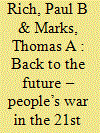

|
|
|
|
|
| Summary/Abstract |
This issue of Small Wars and Insurgencies focuses on the continuing importance of Maoist and post-Maoist concepts of people’s war. It has assembled a collection of papers that addresses various examples from around the world, with an emphasis on South America, where the premier illustration, that of Colombia’s FARC, was Marxist-Leninist but not Maoist, yet embraced the form and strategy of people’s war in a bid which at one point had the state in a critical situation. The collection comes in the wake of previous papers published in this journal on politically Maoist insurgent movements in South Asia, notably Mika Kerttuenen’s study of Maoist insurgents in Nepal and Prem Mahadevan’s survey of Maoist insurgencies in India and their links to organized crime (Kerttunen, “A Transformed Insurgency,” 78–118; Mahadevan, “The Maoist Insurgency in India,” 203–20). The papers confirm that people’s war remains an important analytical framework in the study of small wars and insurgencies, for some even a ‘model’ through which to understand distinct types of insurgent movements and their strategies.
|
|
|
|
|
|
|
|
|
|
|
|
|
|
|
|
| 2 |
ID:
152967
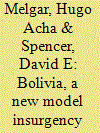

|
|
|
|
|
| Summary/Abstract |
In Bolivia, a brilliantly executed insurgency was carried out between 1995 and 2005, so much so that few perceived it as such. Its most important characteristic was its correct evaluation of the relative correlation of forces and application of the right combination of all forms of struggle. This was possible because of its pragmatism. Though not bound by ideological dogmatism, it nonetheless displayed a deep understanding of insurgency and revolutionary theory. This allowed adaptation and evolution in a changing context. The main form of struggle was not military violence, although it was not absent, but rather violent social protest funded by drug trafficking proceeds. The strategy thus neutralized traditional counterinsurgency models, because it made it difficult to apply coercive force as the enemy was not clearly identifiable. Its success in Bolivia means that the emergence of a new model of insurgency, one still built upon the popular mobilization of people’s war but more attuned to new global realities, is a reality.
|
|
|
|
|
|
|
|
|
|
|
|
|
|
|
|
| 3 |
ID:
178558
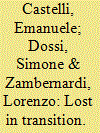

|
|
|
|
|
| Summary/Abstract |
Mao’s military teachings have greatly affected the development of modern counterinsurgency. Although the influence of Mao’s doctrine on modern counterinsurgency has been examined, scholarship has failed to highlight that the reception of Mao’s writings and deeds is based on a misreading of his theory and strategy. In the transition from Maoist people’s war to COIN, two aspects of the former were lost. Firstly, for Mao the use of force remained the decisive instrument in war. Secondly, whereas for COIN the security of the population is a crucial goal, for Mao the population was a mere instrument that could be sacrificed if the conditions of the conflict so required.
|
|
|
|
|
|
|
|
|
|
|
|
|
|
|
|
| 4 |
ID:
151570
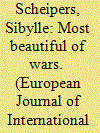

|
|
|
|
|
| Summary/Abstract |
Carl von Clausewitz was both an avid analyst of small wars and people’s war and, during the wars of liberation, a practitioner of small war. While Clausewitz scholars have increasingly recognised the centrality of small wars for Clausewitz’s thought, the sources and inspirations of his writings on small wars have remained understudied. This article contextualises Clausewitz’s thought on small wars and people’s war in the tradition of German philosophical and aesthetic discourses around 1800. It shows how Clausewitz developed core concepts such as the integration of passion and reason and the idea of war in its ‘absolute perfection’ as a regulative ideal in the framework of his works on small wars and people’s war. Contextualising Clausewitz inevitably distances him from the twenty-first-century strategic context, but, as this article shows, it can help us to ask pertinent questions about the configuration of society, the armed forces and the government in today’s Western states.
|
|
|
|
|
|
|
|
|
|
|
|
|
|
|
|
| 5 |
ID:
152959
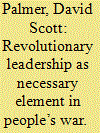

|
|
|
|
|
| Summary/Abstract |
Though it is well understood that all internal upheaval within a polity is a consequence of agency interacting with structure, the importance of the former has perhaps become too pushed to the rear. In reality, as demonstrated by the case of Sendero Luminoso (Shining Path) in Peru, even cases which seem most determined by structural factors, in practice remain problematic, absent necessary revolutionary leadership. This leadership in turn, can make mistakes just as it guides successes.
|
|
|
|
|
|
|
|
|
|
|
|
|
|
|
|
|
|
|
|
|